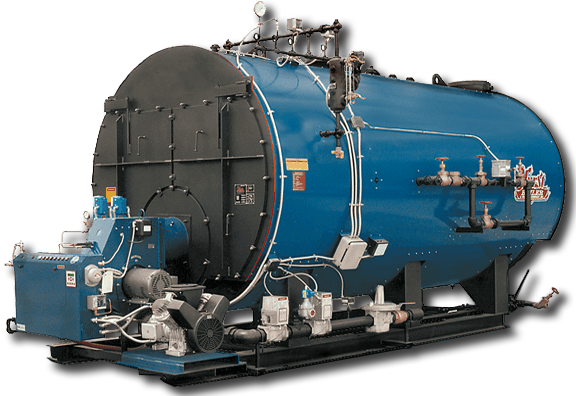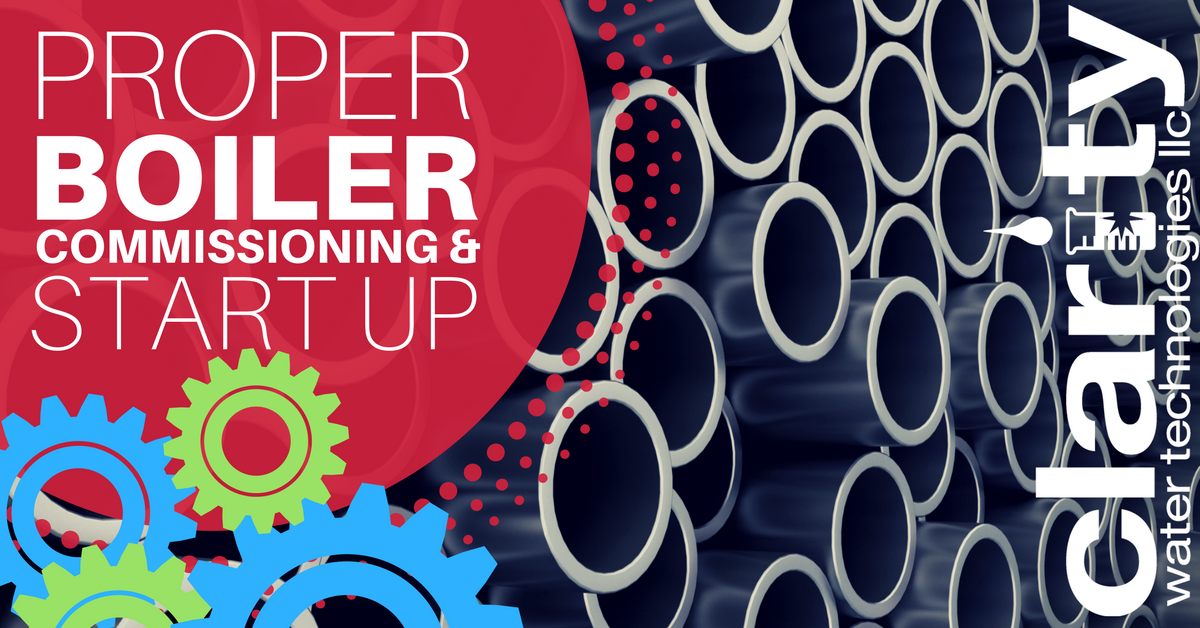Every boiler is unique. Even when they are the same exact models, they are still unique from each other. Metal thickness, skin temperatures, heat tolerances are all direct evidence of this. One of the most important steps in boiler’s lifetime (regardless of make, model or serial number) is when it goes through its initial startup and commissioning process. When done properly, it sets the tone for the how the boiler will operate during optimum conditions. When done poorly, or not at all, it could lead to immediate and profound problems. While there are multiple checkpoints that must be verified and tested during startup, this post will focus on the ones regarding boiler water treatment and what is required for the cleaning and chemical passivation of a new boiler system.
 Proper commissioning is integral part of any good boiler maintenance program. When a new boiler is installed, the pressure vessel will most likely have mill oils, grease, protective coatings and other foreign matter that collect there during manufacturing. Not to mention, there will be additional oils and grease, as well as welding slag (iron and cutting oils), which accumulates during fabrication and installation inside the new piping system. Unless a boiler is constructed with stainless steel or aluminum heat transfer surfaces, an alkaline boil out must be performed in order to remove these oils, greases and other protective coatings (i.e. cosmoline) from the waterside heat transfer surfaces. (IMPORTANT NOTE: Alkaline products should NOT be used in boilers containing either stainless steel or aluminum. High alkalinity in can destroy aluminum and cause stainless steel to become brittle and develop stress fractures. Specialized products must be used to commission these types of boilers.)
Proper commissioning is integral part of any good boiler maintenance program. When a new boiler is installed, the pressure vessel will most likely have mill oils, grease, protective coatings and other foreign matter that collect there during manufacturing. Not to mention, there will be additional oils and grease, as well as welding slag (iron and cutting oils), which accumulates during fabrication and installation inside the new piping system. Unless a boiler is constructed with stainless steel or aluminum heat transfer surfaces, an alkaline boil out must be performed in order to remove these oils, greases and other protective coatings (i.e. cosmoline) from the waterside heat transfer surfaces. (IMPORTANT NOTE: Alkaline products should NOT be used in boilers containing either stainless steel or aluminum. High alkalinity in can destroy aluminum and cause stainless steel to become brittle and develop stress fractures. Specialized products must be used to commission these types of boilers.)
All steel boilers, including mild steel, molybdenum steel, and even cast iron, will benefit from an alkaline boil out of their waterside surfaces. This process is performed during start up and commissioning in order to prevent premature failure due to localized overheating which occurs when boiler water is insulated from carrying away the heat of combustion due to deposition, oil, grease, etc. This phenomenon is sometimes referred to as a “hot spot,” or a place where foreign material adhered to the metal heat transfer surface in the boiler and therefore lends itself to overheating due to localized insulation.
In addition to metallurgical issues that can be caused by improper start up, many plants have steam purity requirements which will not be able to be met if a proper boil out program is not conducted. For example, a cooked vegetable processing plant that uses direct steam in their process to cook and/or peel vegetables could experience severe contamination of their product if they do not conduct a proper boil out on their new (or recently maintained) boilers. This could result in huge losses in production and, if not caught, could lead to potential consumer health related liabilities.
Another example is in a commercial laundry facility, where direct steam is often used at the steam press. Any mill oils present in the system will most likely transfer to the fabric being pressed, thereby destroying it.
Common chemicals used during the boil out process include, but are not limited to, combinations of: Trisodium Phosphate (Na3PO4, 12H2O), Caustic Soda (NaOH), and/or Soda Ash (Na2CO3). It is of extreme importance to always follow the boiler manufacturer’s recommendation(s) in chemical selection, dosage rates, procedures, and time under fire whenever performing the boil out. For example, if your boiler water column gauge glass contains mica, the manufacturer will typically recommend you to either valve-off or install a temporary glass during the boil out evolution in order to prevent damaging the mica. Boilers using round glass water columns usually have no such requirements.
Because alkaline boil out chemicals are so highly corrosive and present such a personnel hazard, it is often best practice to leave the alkaline boil out process to a competent water treatment company which will have the appropriate products, procedures and personnel available to perform such specialized services to meet a wide range of manufacturer and customer needs. Not all water treatment companies will provide the chemicals and service required to properly conduct a boil out.
The importance of a proper alkaline boil out is not only restricted to newly installed boilers, but is equally important for boilers which have been re-tubed in the field. Failing to properly chemically commission a new or re-tubed boiler typically results in one or more of the following detrimental conditions to varying levels of severity:
- Carryover of contaminants into the steam system causing loss of productivity, failure of steam traps, steam purity issues, discoloration of products, etc.
- Increased boiler and water column turbidity and discoloration
- Loss of boiler gauge glass and water column
- Loss or failure of boiler water level control systems, water columns, and/or low water shut downs
- Loss of heat transfer efficiency resulting in increased fuel consumption
- Localized overheating
- Tube pitting and/or under-deposit corrosion
- Departure from nucleate boiling (the inability of the boiler water to generate steam and thus carry heat away from the generating tube as a result of the contaminate insulating the water from the heat source)
- Limited or non-effectiveness of boiler water treatment program to reach the metal surfaces
- Baking on of oils, greases, contaminants as the boiler is continually fired
- Decreased boiler longevity
- Premature boiler failure
Do I only have to chemically commission my boiler once?
Not necessarily. Keep in mind that conducting a boil out does not only apply to a brand new boiler. Anytime a boiler has undergone significant repair or re-tubing, it is probably wise to re-commission the boiler chemically. This is especially true in the case of a steam boiler where the produced steam is used in the process of manufacturing or food preparation. Any mill oils or welding slag that existed in the new tubes will find it’s way into your process.
Do I need to add any other chemicals to my boiler after it is commissioned?
YES! The lack of a proper boiler water treatment program has led to more cases of serious breakdown and premature boiler failure than any other cause. Boiler water treatment is a job for an experience water treatment professional. Unless they have been specifically trained to do so, your typical building operations personnel is most likely not qualified to supervise this important responsibility. Boiler water treatment requires experience and industry specific field hardware to properly administer and it is best left to a reputable water treatment company. Our advice is to hire a full service water treatment professional (not a water treatment consultant); but someone who can actually provide the hands on service, products and expertise required.
Your water treatment professional should be on-site to visit your boiler on a monthly basis. While on-site, he/she will sample and test your boiler water, analyze the sample, and add chemicals of the type and quantity determined by the analysis of the sample. Your vendor may choose to send water samples to a lab; however, they should also be able to do most of the important testing and analysis while they are at your facility.
If my boiler water treatment program is not working as well as I would hope, should I be considering new products?
Sometimes is not the chemicals that are to blame for improper treatment; sometimes it is the person administering them. Determining which boiler water treatment products to use is a very important part of what you are paying you water treatment company for. There are many standard protocols for properly treating hot water boilers and steam boilers. There are also new boiler chemical technologies available today that are turning the whole industry on its ear. Products like Cetamine and EcoSHIELD are both newer polyamine-based families of chemical treatments that are designed to directly treat the steel in your boiler as opposed to the water, making it almost impervious to corrosion or scale. But again, even these new product blends need to be evaluated by your water treatment professional on a case-by-case basis. That said, for many facilities that are maintaining their boilers with old chemical technology, a water treatment program change can potentially do wonders.
When is it time to find a new water treatment vendor?
While having a good water treatment service contract with a reputable water treatment company in place is an extremely important of proper boiler maintenance, there are also daily and weekly maintenance activities that must go on in your plant to ensure good results. Remember, your water treatment professional is there once per month; your operations people are there every day. That said, if you are experiencing significant boiler tube loss or persistent issues with scaling our corrosion, you should consider getting a second opinion from another vendor.
If you would like to know more about common issues with boiler maintenance, please download our free eBook: Ten Huge Mistakes Facilities Make in Boiler Operation and How to Avoid Them below.
As always, thanks for reading!
Download Our FREE eBook Today:
Ten Huge Mistakes Facilities Make in Boiler Operation and How to Avoid Them
Have a question about water treatment and steam boilers?
Check out our steam boiler resource page to find links to helpful articles and case studies that address commonly asked questions.


